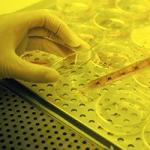
Research Topics
Immunometabolism in Cancer Inflammation
The tumor microenvironment represents a complex, multicellular milieu, where various cell types compete for resources necessary for their function(s). In the case of the tumor, cells must rapidly reproduce while promoting expansion of the host vasculature to maintain nutrient supplies. At the same time, tumor cells subjugate host defense mechanisms to thwart rejection. Many mechanisms for tumor-mediated immunosuppression have been described, and several involve mechanisms based on metabolic alterations. For example, highly glycolytic tumors deplete glucose in the microenvironment suppressing T cell proliferation and activation. The resulting elevated lactate from the tumor can transcriptionally reprogram tumor-associated macrophages into immunosuppressive cells promoting tumor growth and progression. My laboratory has a long history of studying the expression, signaling and function of receptors expressed by innate immune cells in the context of cancer. In recent years, interest in understanding stimulation-induced alterations in cellular metabolic processes and the critical role that they play in enabling immune cells to meet the enhanced metabolic demands associated with activation has exploded. Immunometabolism presents exciting possibilities for unraveling, and possibly therapeutically exploiting, the substantial metabolic interactions between inflammatory cells and the tumor. Therefore, my laboratory has begun to focus on the dissection of the biochemical mechanisms underlying activation-induced metabolic changes in innate immune cells.
Macrophage Metabolic Reprogramming. For example, we have been investigating the mechanisms of metabolic reprogramming in macrophages. Classical activation of macrophages with proinflammatory stimuli such as LPS and IFNg results in the generation of so called M1 macrophages that are directly bactericidal and tumoricidal, and promote adaptive immune responses. Metabolically these cells downregulate their use of oxidative phosphorylation and adapt a Warburg-like metabolism dependent on aerobic glycolysis termed “Glycolytic Commitment”. We found that autologous nitric oxide (NO) was necessary and sufficient to drive the decline in oxidative phosphorylation associated with “glycolytic commitment” and that IL-10 regulated this process. Using unbiased metabolomics, expression analysis, metabolic flux analysis, 13C carbon tracing experiments, and enzymology, we have now extensively defined the role of NO in this metabolic reprogramming. We find that NO is responsible for the rerouting of carbon usage at several points in the metabolic cascade, regulation of inflammatory mediators, and alterations of electron transport chain (ETC) components.
Niche Specific Metabolic Adaptations in Cancer. Because the tumor microenvironment represents a unique physiological niche, we have taken the approach of dissecting the metabolic interaction of leukocytes with their unique niches. We found that the peritoneal cavity is a unique metabolic niche enriched glutamine and glutamate as compared to serum and that resident peritoneal macrophages utilize these fuels to maintain high rates of mitochondrial fitness through a unique engagement of complex II of the ETC.
Moreover, we found that resident peritoneal macrophages (pResf) undergo unique metabolic reprogramming when tumors grow in the peritoneal cavity. These pResf promote tumor growth by expressing the metabolic enzyme Irg1.
Lastly, we identified a cancer-associated population of neutrophils that upregulate mitochondrial function to generate NADPH allowing them to suppress T cell activity even when glucose utilization is limiting. Together, our data have defined unique metabolic adaptations with substantial impact on cancer inflammation.
Biography
Dr. McVicar obtained his Ph.D. from the Medical College of Virginia, Virginia Commonwealth University, where he studied adoptive immunotherapy of brain tumors. He joined the NCI in 1990, completed a postdoctoral fellowship studying leukocyte signaling, and served as a Senior Investigator in the Cancer and Inflammation Program. In 2016, Dr. McVicar was appointed as a Deputy Director for the Center for Cancer Research, the NCI's intramural program. He currently leads the Cancer Innovation Laboratory.
Selected Publications
- Pymm P, Illing PT, Ramarathinam SH, O'Connor GM, Hughes VA, Hitchen C, Price DA, Ho BK, McVicar DW, Brooks AG, Purcell AW, Rossjohn J, Vivian JP. MHC-I peptides get out of the groove and enable a novel mechanism of HIV-1 escape. Nat Struct Mol Biol. 2017;24(4):387-394.
- Baseler WA, Davies LC, Quigley L, Ridnour LA, Weiss JM, Hussain SP, Wink DA, McVicar DW. Autocrine IL-10 functions as a rheostat for M1 macrophage glycolytic commitment by tuning nitric oxide production. Redox Biol. 2016;10:12-23.
- Ma C, Kesarwala AH, Eggert T, Medina-Echeverz J, Kleiner DE, Jin P, Stroncek DF, Terabe M, Kapoor V, ElGindi M, Han M, Thornton AM, Zhang H, Egger M, Luo J, Felsher DW, McVicar DW, Weber A, Heikenwalder M, Greten TF. NAFLD causes selective CD4(+) T lymphocyte loss and promotes hepatocarcinogenesis. Nature. 2016;531(7593):253-7.
- Sen SK, Boelte KC, Barb JJ, Joehanes R, Zhao X, Cheng Q, Adams L, Teer JK, Accame DS, Chowdhury S, Singh LN, NISC Comparative Sequencing Program., CHARGE Consortium., Kavousi M, Peyser PA, Quigley L, Priel DL, Lau K, Kuhns DB, Yoshimura T, Johnson AD, Hwang SJ, Chen MY, Arai AE, Green ED, Mullikin JC, Kolodgie FD, O'Donnell CJ, Virmani R, Munson PJ, McVicar DW, Biesecker LG. Integrative DNA, RNA, and protein evidence connects TREML4 to coronary artery calcification. Am J Hum Genet. 2014;95(1):66-76.
- Orr SJ, Burg AR, Chan T, Quigley L, Jones GW, Ford JW, Hodge D, Razzook C, Sarhan J, Jones YL, Whittaker GC, Boelte KC, Lyakh L, Cardone M, O'Connor GM, Tan C, Li H, Anderson SK, Jones SA, Zhang W, Taylor PR, Trinchieri G, McVicar DW. LAB/NTAL facilitates fungal/PAMP-induced IL-12 and IFN-γ production by repressing β-catenin activation in dendritic cells. PLoS Pathog. 2013;9(5):e1003357.
Related Scientific Focus Areas




Molecular Biology and Biochemistry
View additional Principal Investigators in Molecular Biology and Biochemistry
This page was last updated on Tuesday, June 17, 2025